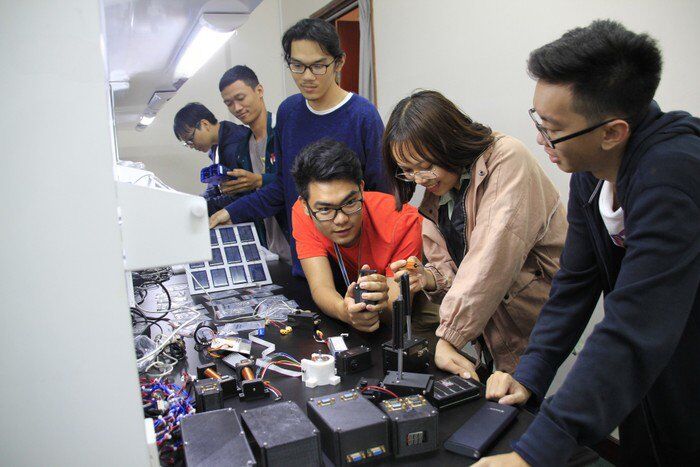Space Technology is a field of study focused on satellite technology applications, including signal and image processing, remote sensing technology, and satellite navigation. Satellite technology has diverse applications in social life, resource management, the environment, territory, islands, and national defense.
A preliminary survey indicates that Vietnam needs at least 2,000 highly skilled workers in the fields of space technology and related applications, such as telecommunications, remote sensing, or the use of satellite imagery in weather forecasting, natural resource management, and more.
There are numerous applications for Space Technology in Vietnam, especially for satellite technology during this digital transformation era. Large datasets from satellites are an important digital resource serving state and enterprise management.

This field of study is not well-known, with only two universities in Vietnam offering it. However, graduates have a wide range of career opportunities. They can work in information technology organizations and businesses, developing mobile device applications, or in government agencies, using satellite data to monitor forest, land, territorial, and maritime resources. They may also work with satellite data businesses and related applications or in fields related to telecommunications, information technology, electronics, or electrical engineering. Alternatively, they can become lecturers or experts in space technology fields.
In 2024, the entrance score for the Space Technology program at the International University – Vietnam National University in Ho Chi Minh City was 21 points.
## 2. Biotechnology
Biotechnology is a field that demands a significant workforce. Graduates can find employment in various sectors, including agriculture, healthcare, and the food industry. While the name may not be as trendy as other fields, those who create value in this industry can still be very successful.

In Vietnam, biotechnology is part of the country’s science and technology development strategy until 2030. It aims to apply biotechnology in various sectors, including medicine, agriculture, forestry, fisheries, and the processing industry, with a particular focus on healthcare. This includes using stem cell technology for diagnosis and treatment, vaccine and drug production, creating biological products for food processing and livestock farming, and developing high-yield and high-quality plant and animal breeds.
Graduates in this field can pursue careers such as Laboratory Technicians, Biology Teachers, Science and Technology Management Officers, and Biotechnology Chemical and Equipment Sales.
Ho Chi Minh City Open University’s Biotechnology program had an entrance score of 16 points.
## 3. Atomic and Nuclear Physics
Atomic and Nuclear Physics is a branch of physics that studies atoms as isolated systems of electrons and atomic nuclei. It primarily focuses on the electron configurations around the nucleus and the processes that cause changes in these configurations. This includes both neutral atoms and ions, unless otherwise specified, assuming that the term “atom” includes ions.

The Atomic and Nuclear Physics program provides fundamental knowledge about atomic structure, one-electron and multi-electron atoms, the arrangement of elements in the periodic table, the effects of electric and magnetic fields on atomic energy levels, and atomic absorption and radiation processes.
In Vietnam, this field mainly trains researchers and specialists. Therefore, only a limited number of universities offer this major. As a result, Atomic and Nuclear Physics is not well-known among students and parents.
Graduates can find career opportunities in research institutes, science and technology departments, hospitals, nuclear reactors, nuclear power plants, nuclear technology application centers, natural resources and environmental departments, and educational institutions.
## 4. Geological Engineering
With the advancement of industry and technology, the extraction of land resources and energy has intensified, creating a high demand for geological experts. Geological Engineering programs provide a solid foundation in geology and the necessary skills for resource exploration, surveying, and management.
Geological Engineering is the scientific study of the Earth to support sustainable infrastructure development, the search for and rational exploitation of natural resources, and the design and treatment of industrial and civil engineering foundations for national defense and security.

Students in this field learn to use software to research and assess the impact of structures on foundation stability. They also gain skills in consulting, designing, and treating foundations for civil and industrial engineering projects, hydropower and irrigation, and assessing reserves, as well as protecting groundwater resources.
Specific job positions for Geological Engineering graduates include Geotechnical Engineer, Researcher, Lecturer in Geological Engineering, Technical Material Designer, Water Extraction Specialist, Soil Improvement Specialist, and Foundation Treatment Specialist. They may also work in environmental management, environmental impact assessment, and geological environment improvement.
Due to the nature of the field, which involves frequent field surveys at mineral mines with inherent dangers, Geological Engineering is considered a less popular major in Vietnam, especially among female students.
In 2024, the University of Natural Sciences – Vietnam National University in Ho Chi Minh City set an entrance score of 19.5 points for the Geological Engineering program.
## 5. Advanced Materials Science and Nanotechnology
Advanced Materials Science and Nanotechnology is a future-oriented field that is currently facing a talent shortage. This presents a great opportunity for young people who want to explore and venture into this emerging field.
Students in this field gain a foundation in the structure of materials, the relationship between creation, structure, and material properties, and modern science and engineering, including heat, mass transfer, and chemical kinetics. They also learn about the economic, social, and environmental aspects of material manufacturing.

As a new field of study, it is not well-known. Only a few universities in Vietnam offer this major, including Hanoi University of Science and Technology, Da Nang University of Science and Technology, Quy Nhon University, and Phenikaa University.
In 2024, based on the entrance examination results, the entrance score for the Advanced Materials Science and Nanotechnology program at Hanoi University of Science and Technology was 22 points, while the University of Engineering and Technology – Vietnam National University in Hanoi and Phenikaa University had entrance scores of 20 points.
































